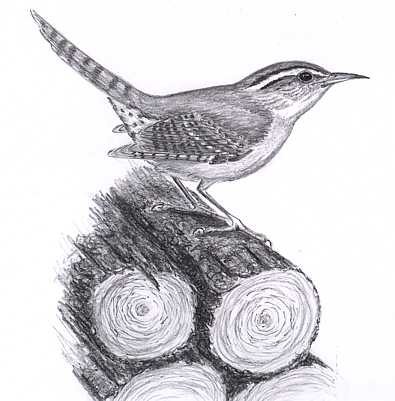
Dear Bird Folks:
I enjoyed your comments a few weeks ago about the chickadee being the best bird. I would like to suggest an even better bird, the Carolina Wren. They are beautiful little birds and lately I’ve been hearing at least two calling in my yard. Is it unusual or do they typically call during the fall?
-Stan, Brewster
Oh, Please Stan,
I knew when I wrote about the chickadee it would be only a matter of time before someone would challenge me by claiming their own favorite bird was the best. But I would never have guessed that, of all birds, the Carolina Wren would be the first choice of someone from New England. You did notice the name of the bird didn’t you? Hello, it’s from Carolina! How does that old song go? Oh yeah. Something could be finer than that bird from Carolina and that’s the Black-capped Chickadee. (I can’t believe I just wrote that.)
It’s important to note here that none of this is a slam against the bird or the state. That little bird is, by far, our most handsome wren and Carolina has a lot of wonderful places, although I can’t think of any right now. Wait, there’s that “South of the Border” place. That’s pretty special. What state wouldn’t be proud to have that fine establishment and its endless billboards decorating the roadside?
Do you remember a few weeks ago we wrote about Great Horned Owls? (I know, I know, that short term memory thing is a drag, so just take my word for it.) That huge owl and your little wren have something in common. And it’s not that they both have the same sign, because they don’t. Wrens are Gemini, while owls are clearly Aries. Rather, they both live all of their lives in pretty much the same area. And they both defend their territory year round. Like the owls, the wren pair will choose an area that provides them with enough winter food and will defend it against other wrens. They are peaceful birds and will allow anything but wrens into their territory. The owls, on the other hand, are a bit different. They will allow other creatures into their territory also, but then they eat them.
As you said Stan, the wrens are most often found in pairs and can sometimes be heard calling back in forth. The female knows that she can’t defend the territory alone, so she keeps in close contact with the male. She will also be on the lookout for danger while the male is foraging. Some of her calls are saying, “Keep out other wrens,” while other calls mean, “You eat honey, I’ve got your back.”
Defending a food source is critical to these wrens, because their winter survival depends on it. As their name implies, this wren is really a southern bird. We are on the most northern edge of their range. If you looked on a range map, you would see that Provincetown, on the tip of Cape Cod, is the furthest north that this little bird reliably lives. And why not? Once they’ve been to Provincetown, they’ve pretty much seen it all.
The best way to keep your wrens happy is by putting out brush piles. They love to sniff around thickets and tangles, looking for food, which is mostly insects. Wrens are more often seen under our feeders than on them. In my yard, the wrens appear to be happier picking up scraps off the ground and only occasionally will they land on the feeder. When they do visit the feeder, they only take a few bites before they head back to the thickets. The first choice of feeder food for a Carolina Wren is suet, they will also take sunflower hearts and, of course, their daily bowl of grits.
Carolina Wrens are wonderful birds. They are well-marked, energetic and will be with you everyday of the year. They make a strong case for second place on the best bird list. But second place is where they’ll stay unless they change their name to New England Wren. Somehow, Stan, I don’t think that’s going to happen.